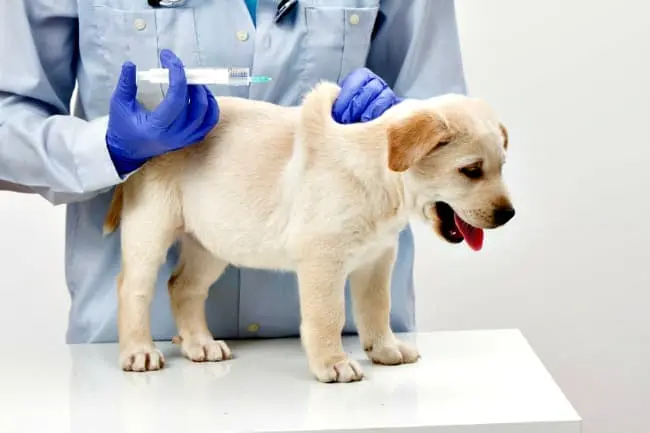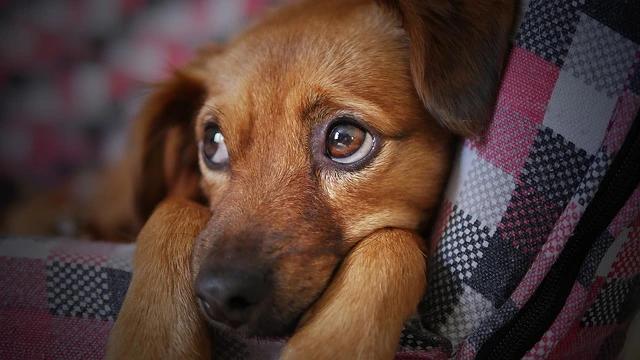Bringing home a new puppy is one of life’s greatest joys. But with all the excitement comes one very real responsibility: keeping your puppy safe and healthy.
One of our readers, Carmen, recently wrote in feeling overwhelmed. Her 8-week-old Golden Retriever was due for vaccines, but she wasn’t sure which ones, when to schedule them, or how to avoid missing something important. If that sounds familiar, you’re not alone.
This 2025 guide simplifies everything. You’ll learn what vaccines your puppy needs, when to get them, and how to protect your dog through each crucial stage of development.

Table of Contents
What Is a Puppy Vaccination Schedule and Why It Matters
Understanding Puppy Immunity and Vaccines
Puppies are born with immature immune systems. They receive temporary protection from their mother’s antibodies while nursing, but this fades between 6 and 12 weeks of age. That’s when vaccines step in.
Vaccines train your puppy’s immune system by introducing a small, harmless amount of a virus or bacteria. This “practice run” helps their body build defenses before they encounter real threats.
Core vaccines protect against life-threatening diseases, including:
- Distemper
- Parvovirus
- Adenovirus (Hepatitis)
- Parainfluenza
- Rabies
Non-core vaccines may be recommended based on your dog’s environment and lifestyle. These include:
- Leptospirosis
- Bordetella (Kennel Cough)
- Lyme Disease
- Canine Influenza
Why Timing Matters
Delaying vaccines or missing boosters leaves your puppy exposed. Viruses like parvovirus can live on shoes and sidewalks for months. The critical window—between 8 and 16 weeks—is when maternal immunity fades but vaccine protection hasn’t fully developed. That’s why consistency in the schedule is key.
The Recommended Puppy Vaccination Schedule (2025)
This schedule is based on current veterinary guidelines. Your vet may adjust it based on breed, health, or location.
| Age | Core Vaccines | Optional Vaccines |
|---|---|---|
| 6–8 weeks | DHPP (Distemper, Hepatitis, Parvo, Parainfluenza) | Bordetella (for social pups) |
| 10–12 weeks | DHPP booster, Leptospirosis (if needed) | Lyme, Canine Influenza (based on risk) |
| 14–16 weeks | Final DHPP, Rabies | Optional boosters (if started earlier) |
| 6–12 months | DHPP booster, Rabies booster | Leptospirosis and Influenza boosters (if needed) |
Veterinarians follow this timeline to ensure immunity builds properly over time. Skipping or combining too many vaccines can reduce effectiveness.
For official guidance, refer to the American Veterinary Medical Association’s vaccination guide.
What to Expect at Each Vet Visit
6–8 Weeks
Your puppy’s first appointment includes:
- Physical exam and health check
- First DHPP vaccine
- Deworming for intestinal parasites
- Flea and tick prevention discussion
- Behavioral and socialization advice. For practical tips on how to start socializing your puppy safely and correcting early behavior issues, read our full guide on puppy behavior problems and solutions.
Recommended product:
Pet MD Canine First Aid Kit
A reliable kit to manage post-vaccine discomfort or minor injuries at home.
10–12 Weeks
Your puppy receives the second DHPP vaccine and may begin Leptospirosis or Lyme shots based on risk.
This is when socialization and confidence-building become important. Consider bringing a favorite toy to the vet and rewarding calm behavior to help reduce stress.
14–16 Weeks
Your puppy receives the final core shots, including the first rabies vaccine, which is required by law in most states.
Veterinarians may check for weight gain, growth milestones, and readiness to transition to adult food in the coming weeks.
6–12 Months
The first-year booster visit typically includes:
- DHPP booster
- Rabies booster
- Any remaining non-core vaccines (if applicable)
From this point on, most vaccines are repeated every 1 to 3 years depending on the vaccine type and your veterinarian’s protocol.
To track everything in one place, we recommend:
Puppy Vaccination Record Book
Simple and effective logbook for appointments and booster dates.
Regional and Lifestyle Considerations
Not every puppy needs the exact same non-core vaccines. Your vet will evaluate:
Geographic risks:
- Lyme disease in the Northeast and Midwest
- Leptospirosis in humid or flood-prone areas
- Rattlesnake vaccine in the Southwest
- Canine influenza in urban areas and shelters
Lifestyle factors:
- Dogs that board, attend daycare, or are groomed frequently may need Bordetella and Canine Influenza
- Hiking or camping dogs may need Lyme and tick prevention
- Travel and exposure to other dogs may call for broader coverage
The goal is to match vaccine protection with your dog’s real-world exposure, not to over-vaccinate.
Helpful Products for Easier Vaccine Visits
Zesty Paws Immunity Bites
Probiotic and elderberry chew for immune support during vaccine periods.
ADAPTIL Calming Collar
Pheromone collar that reduces anxiety during vet visits.
Comfortable Recovery Onesie
Prevents licking at injection sites and aids in post-shot recovery
Common Mistakes to Avoid
Missing booster appointments
Vaccines must be spaced appropriately to be effective. Missing a booster can compromise immunity.
Skipping optional vaccines too soon
Just because a vaccine is non-core doesn’t mean it’s unnecessary. Social dogs or travelers often need them.
Over-vaccination or self-vaccination
Too many vaccines at once, or administering vaccines without veterinary guidance, can create health risks.
Early socialization without immunity
Your puppy isn’t protected until 7 to 10 days after the final vaccine. Avoid dog parks or pet stores until then.
Poor record-keeping
Losing track of your dog’s shots can lead to missed boosters. Use a health journal or app to stay organized.
When to Call Your Veterinarian
You should contact your vet immediately if your puppy:
- Vomits, collapses, or has trouble breathing after a vaccine
- Has facial swelling or hives
- Becomes unusually lethargic for more than 48 hours
- Misses two or more scheduled vaccinations
- Has a chronic illness or is immunocompromised
If your puppy has contact with unvaccinated dogs or is exposed to a known disease, call your vet right away. They may recommend a modified schedule or early boosters.
For more on vaccination reactions and modified schedules, visit the VCA vaccine guidelines.
Frequently Asked Questions
How much do puppy vaccines cost?
Expect to spend between $75–$150 per vet visit. The full vaccination series typically totals $200–$500 depending on location and required vaccines.
Do small breeds need fewer vaccines?
No. Vaccine type and schedule are based on age, not size. However, small dogs may need closer monitoring for side effects.
Can I take my puppy outside before vaccines are complete?
Avoid contact with unknown dogs or public surfaces. Socialization at home or with fully vaccinated dogs is safe. Understanding the balance between necessary socialization and disease prevention during this critical window requires careful planning and knowledge of which environments are truly safe for unvaccinated puppies.
What happens if I miss a vaccine?
Call your vet. They’ll decide whether to continue or restart the series depending on how much time has passed.
Can titer tests replace vaccines?
Titer tests measure antibody levels and can confirm immunity for certain diseases. They’re most useful for adult dogs, not during the initial puppy schedule. Rabies vaccines are required by law regardless of titers.
Conclusion
A proper puppy vaccination schedule isn’t just a medical routine—it’s a foundational step toward a safe, confident, and healthy life for your dog.
By following this guide, staying on schedule, and working closely with your vet, you’re making a smart investment in your dog’s future. You’re not only protecting them from preventable diseases but also setting them up to safely explore the world by your side.
Your dog depends on you to make informed choices. This guide empowers you to do just that.
Disclaimer: This article contains affiliate links. As an Amazon Associate, we may earn a small commission if you purchase through our links—at no extra cost to you.

